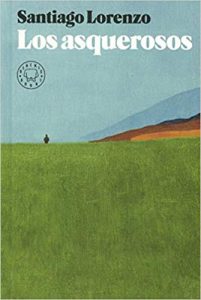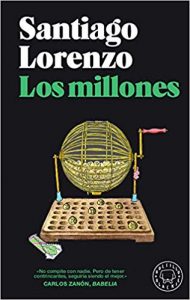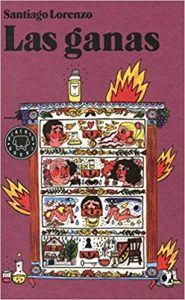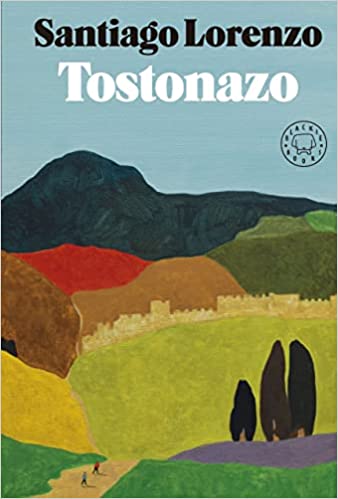The foray into the novel, in the case of authors as creative as santiago lorenzo, arrived in his case from the cinema and with that underground point with which he has broken into the lyrics, he always predicts the awakening of a new countercultural reference. And literature is always in need of a countercurrent point to combat the linear, the hackneyed, the recurrent ...
It is not that there is no imagination, ingenuity and craft among so many proposals, great authors and publishing labels. But when guys like Houellebecq or at the time Bukowski (to cite two great countercurrent creators) and in this case Santiago Lorenzo, they arrive with their desire to tell something in their own way, without adhering to other guidelines beyond the imprint, something different ends up emerging.
Welcome the exceptionally different, to the arguments that address stories between the surreal, the transgressive, the irreverent or the disruptive. Let's take a parenthesis between our bedside books recommended by critics, massively valued by readers and clinging to the canons of genres. Let's enjoy literature without labels.
Top 3 recommended books by Santiago Lorenzo
The disgusting
I dont know what i would think Daniel Defoe This Iberian Robinson Crusoe with evident parody overtones that in the end ends up being oriented more to a current humorous criticism in which it is shown that survival beyond the era of connectivity is possible, in the best of interpretations.
Manuel is a luck of maqui of our days that flees to a remote place of that Spain full of small towns full of echoes and oblivion. And there, in the middle of nowhere, Manuel becomes a fugitive ascetic. Ever since he stabbed the policeman, moved by his rebellious spirit that placed him in the most inappropriate place at the right time, he decides to escape the clutches of a justice that claims him for his improvised crime of blood.
It is then that the novel becomes a regression with a comic vision and with a deep point of acid criticism. Regression because with Manuel we rediscover the most unique aspects of a simple life, disconnected from noise, delivered to the day-to-day without major projections. And of acid criticism because from that evolution of Manuel's new stage a reflective intention can be extracted about the paths of our current society.
It is not easy to tell a story that does not offer very dynamic action, a high-voltage narrative tension (regardless of whether Manuel will ever be discovered). And yet, the story engages in this rediscovery of everything, in the naive journey of the urbanite immersed in a new environment in which what was once common now points to an impossible mission.
The author is right in his almost alienated description of Manuel's new reality. A perspective that provides that comic notion about what we have become in an evolutionary leap thanks to a technology that has favored the forgetting of our most basic forms of relationship with the environment.
As the pages turn, we are faced with a shocking lucidity. Our society, saturated with the imperative and the immediate, suffers from great aspects necessary for this self-realization that can start from the simplest, from the determination of the use of time fully conscious.
But all these ideas do not reach us with what can be interpreted under a philosophical and sociological load. You just have to accompany Manuel and let yourself be carried away. Doubts, laughter and a tension that governs at all times over what brought Manuel here and what could become of him, provide that balance, that reflection in which we discover the unique symmetries on either side in a way of life and another.
The millions
The first novel by this author. And a shameless invitation to that different proposal already announced in the lead of this particular selection.
The stridency of an argument started from a character as outdated as a GRAPO activist can be, end up serving the cause of a new grotesque made into a novel, with that touch of fatalistic humor, revisionist of the miseries of a part of the Spanish idiosyncrasy that abounds in a picaresque arrival to the dark side in a few days in which capitalism raises canonical images while destroying the few strongholds of authenticity.
The characterization of the characters, between the comic and the fatalistic, serves to compose a very lively plot loaded with corrosive humor, but with that background that ends up awakening the paradoxes of our lifestyle, of our shortcomings covered with material things.
While we advance in the journey of the GRAPO agent, in search of collecting his millionaire lottery ticket without raising clues that could end it, we end up laughing at our own miseries, at our gods with feet of clay and at the destiny presented as the image and the success in which the obvious deformities come to us like that aforementioned grotesque, recovered from Inclán Valley and rebuilt in our days. Only, in the end, between the unworthy and the unjust, the author has known how to fill with illusion and hope in the truly human concentrated in the brilliant Francisco and Primi.
The desire
If in any of Santiago Lorenzo's stories we can find, in the background, that taste for the clearly human in the emotional and existential, this plot ends up approaching it with stark theatrical intention.
In Benito we find that alter ego of every reader, faced with what he would finally want to undertake in his life, on his most personal plot, but who always parks among material trifles (collecting key rings has its point when you have nothing better to do) .
Saturated by his shortcomings even physiologically, Benito is closing more and more in his shell in front of the opportunity of his life, telegraphed by his destiny with red letters of URGENT. If Benito were able to contact María personally, perhaps all his ills would disappear, even in that part of the sexual that has him dizzy. But the author likes that recreation in self-imposed frustration, in his ridiculousness.
On the horizon of a plot with hints as comic as they are tragic in the same scenes, the meeting between Benito and María appears as the possibility of a great orgasm that reconciles the sufferer with life.
Other recommended books by Santiago Lorenzo…
tostonazo
It never hurts to break a spear in favor of boredom. The greatest absurdities and the most absolute genius in equal parts have been born from boredom. And the imagination is triggered when it has nothing else to do. But today boredom is underrated. Getting bored is for losers in a world overloaded with leisure possibilities that are becoming less and less fun. With which classic boredom becomes a much worse boredom, a boredom from which it is more difficult to get something productive...
A luminous hymn to life against boredom. Reading this novel is the best act of resistance. This is a novel about those who make life possible and those who make it impossible. About feeling different in a world of people who want everything to stay the same. Our protagonist is one of the first: a guy without a job or benefit who suddenly finds himself working as an intern in the center of things: a film in Madrid. A shoot bossed around by an ignorant cynic who rules over everyone.
To forget about the capital, he is forced to accept a job in an apparently worse place: a provincial city, one of those that is said to be dead and where nothing seems to ever happen. However, that is where he discovers friendship, the joy of being and livable life. TOSTONAZO is a luminous novel that speaks of the shadows of this country. A political and tender story. About looking for life and finding brilliance, away from the spotlight and the cretins. Reading it is rebelling against what it touches and unmasking the bad guys for what they are, even if they don't suspect it: a bore.





I just read the disgusting ……. Fuck what a discovery !!! Santiago Lorenzo the new Quevedo. To laugh and think. Congratulations
Yes, burlesque and satirical like himself ... Thank you, Pepe.
Certainly the best books I have read in many years, without forgetting the one that I liked the most, «Los orfanitos». Reading them is one of the greatest pleasures that literature gives, they give a lot to think about how we lead our lives and where we want to go. Much humor.
Thank you very much for your words, (already) friend Juan. A hug, SL
To send, Santiago. And congratulations! You are like a shot with the disgusting. I wish you the best. Greetings!